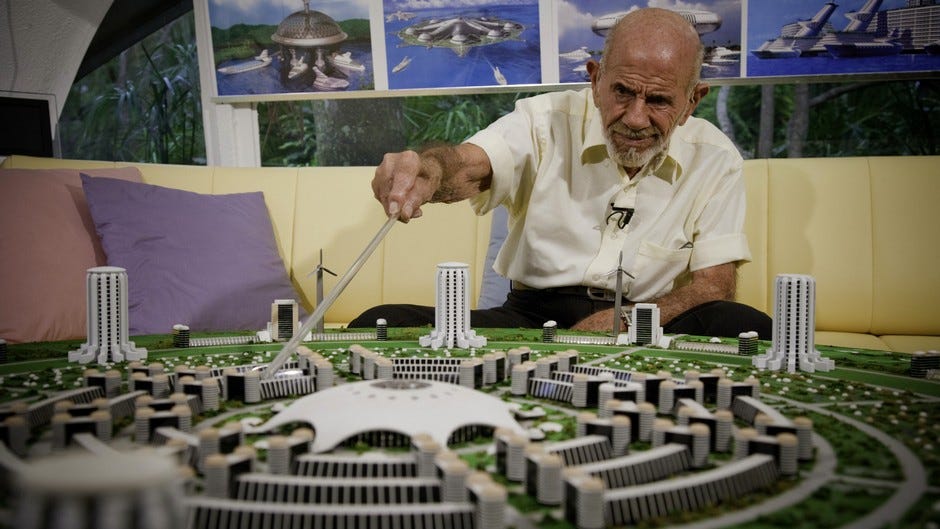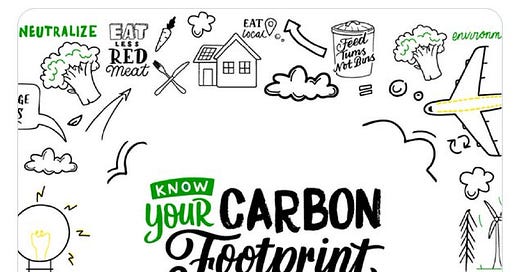

Discover more from Oxymoron
Will AI eliminate business?
In the mid 2000s I was frustrated by the narrative in the environmental movement that business was the problem. In many ways, I agree that businesses were and are part of the problem, but I found the narrative unhelpful. It pointed fingers at a problem without offering a tangible solution. What did the environmentalists want us to do? Abolish business?
This was in part what motivated me to start Wholegrain Digital with my wife Vineeta, as an experiment to see if it was possible to run a business in a sustainable way. It's an experiment that a decade and a half later is still ongoing, and which led to the creation of this newsletter.
Although the idea of abolishing businesses has always seemed a bit ridiculous to me, it has somehow stuck in my head as an intriguing thought experiment. Recently, that thought experiment has started to take on a new light as we enter the era of AI, and today I thought I’d dip a toe in that water to explore it. Buckle up and hop in the (driverless) car.
The robots are coming
I was chatting to my brother recently when he mentioned Rishi Sunak’s interview with Elon Musk at the UK government's AI Safety Summit hosted at Bletchley Park. When asked about the impact of AI on jobs, Musk stated matter of factly that given time, "There will come a point where no job is needed”. He quickly clarified that people could work if they wanted to, but the centre of the message was that AI and robots will be able to do all jobs. It’s a matter of when, not if. That might seem like a stretch to many people but it's an interesting possibility to consider. If this were to come true, what would it mean?
My brother is a talented marketer who works predominantly with law firms and AI is already showing potential to assist his work delivering better outcomes for clients. But if we track forward in time, we might see a day when it becomes so good that it can do all the work for him and all he has to do is ask an AI to run marketing campaigns for his clients. If that day came though, the law firms that hire him wouldn’t need a marketing firm anymore as they could simply get the AI to do their marketing for them directly.
Track forward a little further and the law firms would also start using AI to do their legal work until eventually, one day, nobody needs a law firm anymore because they can get the advice and representation they need from an AI.
Marketing firms and law firms would have been eliminated, not individually, but as entire sectors. Some sectors would take longer to fall than others, but eventually all sectors across the global economy would fall like dominoes. If Musk's prophecy did come true, it wouldn't just mean the end of all jobs, but the end of all businesses.
At this point, you might think that it wouldn't end all businesses because the AI firms would be thriving, as would the telecoms and data centre providers that they rely on, not to mention the robot manufacturers. However, economies are reciprocal systems like ecosystems. A healthy economy thrives not because someone has all the money but because the money keeps circulating, meaning that you can only have customers if your customers have money. If the AI firms did manage to “win capitalism” then they would simultaneously end capitalism.
It wouldn't matter if governments tried to stimulate the economy by printing money and handing it out like they did during the Covid pandemic because there would be nothing to spend the money on other than AI, and the AI firms themselves would have nothing to spend it on. The AI sector would simply become a black hole where all the money goes to die. Taken to its ultimate conclusion, we can see that our current economic system is incompatible with a truly dominant AI future.
Is that a bad thing?
In some ways, the big tech firms that dominate the emerging AI space are the poster children of capitalism, not least Open AI, which managed to turn an apparently benevolent non-profit into a cavalier for-profit business worth billions of dollars. It would be ironic for them to accidentally knock down their own house of cards, but all empires fall and theirs will be no different.
There are many people for whom that day can’t come soon enough. The call to “end capitalism" is not uncommon among social and environmental activists but it has always seemed like an impossible vision. Never in my lifetime has there been a feasible mechanism by which that could happen but perhaps that has now changed, even if not by design.
If the rise of AI did trigger the collapse of our current economic system, what would happen then? I think it's fair to assume that any economic collapse would cause at least short term pain to the majority of people. The question is what would emerge from that crisis? Would it be the sustainable and egalitarian utopia that social and environmental activists dream of, or a new form of dystopia?
Realistically, the wealthy elite who dominate our current system are unlikely to give up easily, and even if money becomes worthless, they would still retain power through ownership and control of AI as well as land. It would be naive of us to think that they would voluntarily give up that power to implement a more balanced system. Power is a seductive thing and the tech elites have already been seduced. But what would they do to hold on?
Perhaps they might try to implement some sort of mock economy based on a universal basic income in order to create the illusion of an economy and prevent things from descending into chaos. Or perhaps money would become irrelevant, even for them, and they would settle simply for having control through a form of AI authoritarianism. Whichever way they leaned, they would be unlikely to volunteer to share the true fruits of the technological revolution with the rest of us.
If we leave it to those who currently hold the power, it seems unlikely that the 21st Century replacement for 20th Century capitalism would be the golden age that many of us dream of. We might wish to end capitalism, but in the absence of a better alternative, we should be careful what we wish for.
Look for the gap
At this point, I think it's important to clarify that I believe there are many reasons why we might never reach this point, but when people like Musk talk of eliminating all jobs, it's worth sitting up and taking note. After all, he does have a habit of delivering the impossible, even if he’s always late.
So how can we take something positive from this?
I think first of all, we should stop and recognise that as the Doc says in Back to the Future, “The future hasn't been written yet” and there is a genuine opportunity for radical economic change of some form on the horizon.
The unfolding AI revolution presents as much of an opportunity as it poses a threat. Nobody, not even those at the centre of AI development, know how this chapter of history is going to play out. It’s when we face the greatest uncertainty that we have the greatest opportunity for change and so now is the time to start imagining where we want to go.
When I was 16, I was lucky enough to go mountain biking in the Alps and on a particularly rocky stretch of downhill trail, our guide advised us that “the bike will go where you are looking. If you want to avoid the rock, never look at the rock. Always look at the gap you want to pass through”. That advice has served me well not just when riding a bike, but in all aspects of life. As the potential for change increases, we need to start looking for the gap. We need to put our energy into creating visions for the future that we do want rather than fighting what we don't want. Change is coming anyway, so our focus should be on shaping what that change looks like.
We also have an opportunity here to stop and ask ourselves what it truly means to be human, and what really matters to us in our own lives and work. Do we want to sit around being fed by robots or do we want to experience life and contribute to society in ways that are uniquely human, meaningful and rewarding? I think we all know the answer to that question and so we need to explore how we can build lives that are rooted in the essence of what it means to be human and that people wouldn't want to replace with AI, even if it was technically possible.

Perhaps this is the time when we should start to look at the work of visionaries who have dared to imagine a different future. Visionaries like Jacque Fresco, whose Venus Project proposed a world where some sort of benevolent AI would maintain global ecological balance and distribute resources fairly to all of the world's citizens. Or the comedian Simon Amstell whose film Carnage depicts a future in which humanity forgives the past horrors it has inflicted upon animals and moves into an era of love and compassion for all beings. Or Klee Irwin, the founder of Quantum Gravity Research whose work in theoretical physics aims to usher in an era of peace and abundance.
It’s easy to write these visionaries off and find holes in their proposals but in some ways it doesn’t even matter if we agree with their visions. The point is that they have one, and looking at possibilities that differ from the status quo can help us to open our minds and see that a different future might be possible. Those who have dared to dream should be an inspiration to us all, even if we personally have different dreams.
It’s time to dream
In our exploration of “sustainable business” here on Oxymoron, perhaps we should consider that the concept of business as we know it might one day fade away and be replaced by something different. If it does, then there’s no guarantee that eliminating “business” would deliver the social and environmental benefits that we want, but the very possibility of change does give us the opportunity to start asking some bigger questions and putting forward some more daring proposals for the future of human society. I'm not foolish enough to claim that I know how the AI era will pan out, but I do think that a big change is coming and it's ours for the taking if enough of us stand up and grab it. Let’s aim for the gap.
If the topic of AI and what it might mean for a socially and environmentally harmonious future intrigues you, you might also enjoy my other Substack, Humanitas et Machina, a series of fictional short stories aiming to bring visions of hope in the face of humanity’s biggest challenges that also explores the risks and opportunities of a future with AI. Find out more about the project.
P.S. Apologies again for no audio version this week. I’m keen to do them as often as possible as I’ve had feedback that many of you appreciate them, but time and physical constraints sometimes mean that it isn’t possible. Thanks for your understanding.














